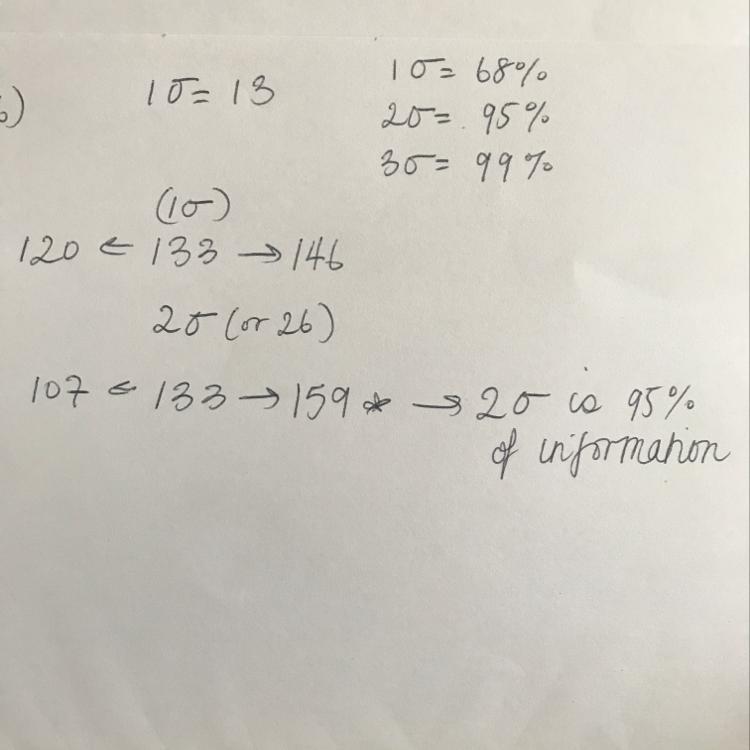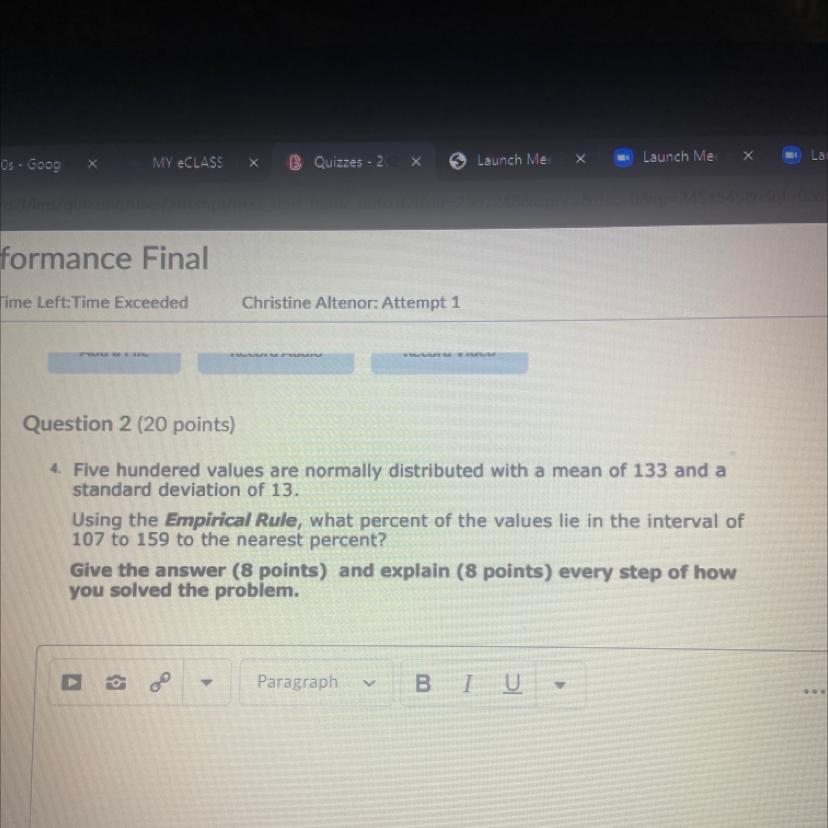Answers
1 standard deviation is 13
To find out the range of scores that fit 1 standard deviation from the mean, you would have to take away and add 13 from the mean (133) this gives a range of 120-146 which isn’t right because you’re looking for 107-159.
Next, look for 2 standard deviations from the mean which is just 13 x 2=26.
To find the range of scores that are 2 standard deviations from the mean take away and add 26 to the mean (133) which gives a range of 107-159. This is the correct answer.
2 standard deviations represents 95% of the data. That’s why I think the answer is 95%.

Related Questions
Simplify:
7x3 + 5x2 – 2 = [?]
X=-1
Answers
Answer:
so the answer for your question is -4
A rectangular prism has a volume of 100 cm3. The length of the prism 25 cm, the height is 2 cm, but the width is unknown. What is the width of the rectangular prism?
4cm
2cm
3cm
none of the above
Answers
Answer:
w = 2 cm
Step-by-step explanation:
100 = 25 x 2 x w
w = 2 cm
The width of the rectangular prism is 2 cm.
What is volume?Volume is the amount of space occupied by a solid shape.
To calculate the width of the rectangular prism we use the formula below.
Formula:
V = lwh................. Equation 1Where:
l = Length of the prismw = Width of the prismh = Height of the prismV = Volume of the prismMake w the subject of the equation
w = V/lh................Equation 2From the question,
Given:
l = 25 cmh = 2 cmV = 100 cm³Substitute these values into equation 2
w = 100/(25×2)w = 100/50w = 2 cmHence, the width of the rectangular prism is 2 cm.
Learn more about volume here: https://brainly.com/question/1972490
#SPJ2
Solve this
4( x + 4)=
Answers
Answer:
4x + 16 - simplified
Step-by-step explanation:
The route that Verlonda takes from her house to a store is represented on the grid below. Which ordered pair represents a point on Verlonda's route?
Answers
Answer:
(3.8)
Step-by-step explanation:
Given
See attachment for grid
Required
Which point is on Veronica's path
On the attached grid, I plotted each of the coordinate pair (i.e the given options, A to D) on the grid.
By observation. we can see that:
A is on the vertical line (y intercept)
B is on the second quadrant
C is just few points to the left of the given path
D represents Verlonda's house
Hence, the required coordinate pair is: (3.8)
Please help, Find the perimeter of the figure
Answers
Answer:
24
Hope that this helps!
Answer:
24 inches
Step-by-step explanation:
starting from 4 going clockwise, add the inches to get the perimeter:
4 + 5 + 1 + 5 + 9 = 24
Someone please help me I’ll give out brainliest please dont answer if you don’t know
Answers
Answer:
x≥−3
Step-by-step explanation:
Let's solve your inequality step-by-step.
2x+3/ −3 ≤1
Step 1: Simplify both sides of the inequality.
−2/ 3 x−1≤1
Step 2: Add 1 to both sides.
−2/ 3 x−1+1≤1+1
−2/ 3 x≤2
Step 3: Multiply both sides by 3/(-2).
( 3/ −2 )*( −2/ 3 x)≤( 3/ −2 )*(2)
x≥−3
Answer:
x≥−3
Which of the following graphs represents all values of x for which (2 + 1)(x - 3) <0?
(PLEASE HELP!!) :(
Answers
Answer:
D
Step-by-step explanation:
x < 3
Solve for x. (URGENT)
Answers
Answer:
i'm guessing x is 13
Step-by-step explanation:
supplementary. a line adds up to 180 degrees. if 15+8 is 23 then x+10 should be 23 too. they're perpendicular in a circle and a circle is equal all the way around.
thats my thought process
Which point would NOT be a solution to the system of linear inequalities shown below?
Answers
Answer:
(-1,1) would not be a solution to the system of linear inequalities presented in the problem. Simply substitute the x and y values in the coordinates provided to see if they would work as solutions.
Hope I helped, have a nice day :)
Answer:
(-1,1)
Step-by-step explanation:
If we try to substitute this values in the second inequality we have
1 > 4 (false)
Can someone please help me with math.
Answers
Answer:
D
Step-by-step explanation:
If you multiply all sides by 2 you get the same dimensions.
Find the volume of a right circular cone that has a height of 12.4 m and a base with a
diameter of 5.1 m. Round your answer to the nearest tenth of a cubic meter.
Answers
Answer:
84.4
Step-by-step explanation:
done
Volume of a right circular cone is 84.39 m³
What is volume?
The amount of space occupied by a three-dimensional figure as measured in cubic units.
Given:
height = 12.4 m. base diameter= 5.1 m, radius= 5.1/2 m
Volume of right circular cone= 1/3* π* r²*h
= 1/3*3.14* 2.55*2.55*12.4
= 84.39 m³
Hence, the volume of right circular cone is 84.39 m³
Learn more about volume here:
brainly.com/question/12212265
#SPJ2
Can someone answer all my questions please that this will help me pass grade
Answers
Answer:
Number 1 is S
Number 2 is 0.4
Number 3 is 8 yards per second
Number 4 is 4 hours.
The first three terms of arithmetic progression are -5,-1 and 3.Find the six term.
Answers
Answer:
15
Step-by-step explanation:
The pertinent general formula for this arithmetic progression is
a(n) = a(1) + d(n - 1), where d is the common difference. That difference is d = 4.
Here, a(n) = -5 + 4(n -1)
Therefore, a(6) = -5 + 4(5) = 15
Answer:
It is 15.
Step-by-step explanation:
Alright, first lets find the pattern. Since its a arithmetic sequence, it has something to do with adding/subtracting.
With the values, -5, -1, and 3. Notice something about them? -1 is 4 more than -5 & 3 is 4 more than -1. There's a pattern! The pattern is that for every new term, it is 4 more than the one before it.
With this, we can make a table to find the 6th term!
(Given)
1st Term: -5
2nd Term: -1
3rd Term: 3
Now, continue adding 4 to each term...
4th Term: 7
5th Term: 11
6th Term: 15
For the 6th term, it has been found that the answer's 15.
If the value of "y" varies directly with "x"
and y = -8 when x = 4.
Find "y" when x = -4.
Enter the number that belongs in the green box.
y = [?]
Answers
Pls pls help quick I rlly don’t know I just need a value for x
Answers
Step-by-step explanation:
3(x - 3) = 3(2x - 3)
3x - 9 = 6x - 9
- 3x - 9 = -9
-3x. = 0
x = 0
9 - (12 + 3) + 8 x 2 using PEMDAS.
Helppppp!!!!
Answers
Answer: 10
Step-by-step explanation:
parenthesis first 9 - 15 + 8 x 2
multiply 8 x 2
you now have 9 - 15 + 16
subtract first because addition and subrtaction go in the order they're in the equation: 9 - 15 = -6
then add -6 + 16 = 10
what would you do to rationalize the denominator and simplify [tex]\frac{5}{\sqrt{2} }[/tex]
Answers
Answer:
(5√2) / 2
Step-by-step explanation:
Multiply
(5 / √2) * (√2 / √2) = (5√2) / 2
hope this will help you
good luck
PLEASE HELP
In a certain Algebra 2 class of 30 students, 16 of them play basketball and 8 of them play baseball. There are 12 students who play neither sport. What is the probability that a student chosen randomly from the class plays both basketball and baseball?
Answers
Answer:
6/30 or 1/5 or 0.2
Step-by-step explanation:
plz help me plz plz plz plz plz
Answers
Answer:
38
Step-by-step explanation:
The area of a kite is equal to half the product of the diagonals
To find the area we must first find the measures of the diagonals
short diagonal = 2 + 2 = 4
longer diagonal = 8 + 11 = 19
We then calculate the area by multiplying the two diagonals together and then dividing that by 2
A = 19 * 4 = 76
76 / 2 = 38
Hence, the area of the kite is 38m²
38m².
Answer:
Solution given;
diagonal 1=8+11=19m
diagonal 2=2+2=4m
the area of a kite =½*diagonal 1*diagonal 2
=½*4*19=38m²
The area of kite is 38m².
If AB = 15, what is the length of DE?
12
14
16
18
Answers
Answer:
16
Step-by-step explanation:
Answer:16
Step-by-step explanation:
A man drops a ball from the top of a 300 foot cliff. The height of the falling ball is modeled
by h(t)=-16t2+300 where h is in feet and t is in seconds. How long does it take for the ball to be 44 feet above the ground?
Answers
Answer:
The ball reaches 44 ft above the ground after 4 sec.
Step-by-step explanation:
Set h(t)=-16t^2+300 equal to 44 feet and solve for time, t. Indicate exponentiation with " ^ "
-16t^2 + 300 = 44 becomes
-16t^2 + 256 = 0, or 16t^2 = 256. Then, taking the square root of both sides, we get:
4t = 16, or t = 4 sec. The ball reaches 44 ft above the ground after 4 sec.
The ball will take 4 seconds.
What are quadratic equations?A quadratic equation, or simply "quadratics," is a polynomial equation with a degree of two as its highest. This is how it is expressed:
a x² + b x + c = 0 where x is the unknown variable and the constant terms are a, b, and c.
Given equation of height h(t) = -16t² + 300...…..(1)
where h is height in feet and t is time in seconds,
and height at t = 0 is 300 feet
when ball is 44 feet above ground then time is,
put h = 44 in equation 1
44 = -16t² + 300
16t² = 300 - 44
t² = 256/16
t = √16
t = 4
Hence time taken by ball is 4 seconds.
Learn more about quadratic equations;
https://brainly.com/question/17177510
#SPJ2
The area of the
rhombus is 52 m2
What is the base of
the rhombus?
Answers
i have explained through pictures
pls help! Evaluate for m: 6 – 4m = 26
Answers
Answer:
m = -5
Step-by-step explanation:
solve for x.
FILLER
please help asap!
thanks
Answers
Answer:
Option B
Step-by-step explanation:
By applying Pythagoras theorem in the given right triangle,
(Hypotenuse)² = (leg 1)² + (leg 2)²
Now substitute the measures of each side in the formula,
(13)² = x² + (12)²
169 = x² + 144
x² = 169 - 144
x² = 25
x = √25
x = 5
Therefore, Option B will be the correct option.
PLEASE HELP WITH THIS
Answers
Answer:
a.2b.area of one triangular faces =9m²
2×9m²18m²
Perpendicular distance between the base of a triangle and the opposite vertex is called _____of the triangle
Answers
Answer:
Median might be the answer or maybe the height?
b ÷ 8 + 3 = 6
Please help
Answers
Answer:
24 divided by 8 +3 =6
Step-by-step explanation:
Deltamath
Please help me I need help!!!!
⚠️Due today!!⚠️.
Answers
You put $2000 in account with a simple rate of 1.5% how long does it take for the account to earn $60
Answers
Answer:
0.5
Step-by-step explanation:
The formula is I= prt
I= 60
P= 2000
r= 1.5%
60= 2000×1.5/100×t
60= 30t
t= 30/60
= 0.5
Hence the time required is 0.5 years
Tell whether the angles
are
complementary or supplementary. Then find the value of c.
(6x + 1)
290
Answers
Answer:
Complementary, x=10
Step-by-step explanation:
Complementary angles mean they add up to 90 degrees.
So 29+(6x+1)=90.
30+6x=90
6x=60
x=10
Answer:
Complementary-------- x= 10
Step-by-step explanation:
only 90 degrees
(6x-1)/2930+6x = 90-----------------------------
3. 6x = 60
=======================
x= 10
